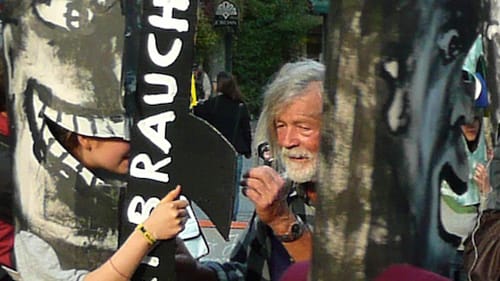Stay in the Loop
BSR publishes on a weekly schedule, with an email newsletter every Wednesday and Thursday morning. There’s no paywall, and subscribing is always free.
So long, it's been good to know you
Icebox Project Space presents Bread and Puppet Theater's 'The Basic Byebye Show'

As Bread and Puppet Theater’s The Basic Byebye Show ends, a pair of enormous papier-mâché angel’s wings protruding from the edges of the diminutive proscenium begin beating. It’s as if they might carry the stage and all it contains away to some more palatable and purifying paradise.
This gesture of valediction captures the company’s exultantly critical ethos, which always concerns bidding farewell to the world as it is and charting a course toward what it could and should be. Bread and Puppet has been making anarchic, utopian, anticapitalist puppet shows since its founding in 1963 by Peter Schumann on Manhattan’s Lower East Side.
In 1974 they relocated to a farm in Glover, Vermont, where their two-day Domestic Resurrection Circus took place every summer until 1998. The company tours regularly, bringing both “good” and “bad” puppet shows to communities here and abroad.
“Good” shows tend to be more uplifting and riotous, while “bad” shows are more somber and influenced by current headlines. Performances are always followed with a serving of coarse, delicious sourdough rye bread, traditionally baked by German émigré Schumann. Like his work, Schumann’s bread is not easily swallowed. Both require effort to consume and are more nourishing for it.
Bad show, good work
The Basic Byebye Show is a “bad” show, confronting the contemporary scourges of climate change and unchecked gun violence. Framed by fabric printed with words ranging from the material (“Earth,” “Rain,” “Air”) to the spiritual (“Resist,” “Awake,” “End”), the stage is traversed by blocky black-and-white puppets modeled on Albrecht Dürer figures.
These characters speak mainly in squawks and other zany prelinguistic utterances and illustrate losses and transformations. A birch forest grows while its branches are lost to an ice storm. An earthquake rocks a city of skyscrapers. The masses march through the streets armed with assault rifles.
Dürer, best known for his 15th-century Apocalypse woodcuts, based that work on imagery from the final book of the Bible, Revelation. He’s an apt inspiration for Bread and Puppet’s meditation on Trump’s America and our environmental end times.

Punctuated by voices calling “goodbye” while hands wave handkerchiefs in farewell gestures, The Basic Byebye Show unfolds in a sequence of episodes. Some are more poetically abstract, others crude. Cardboard iterations of the Four Horsemen — Death, Famine, War, and Pestilence — ride through the playing space to the accompaniment of morose violins and a discordant orchestra.
But the sharpest, funniest, and most devastating episode includes a 15-foot James Madison puppet serving as a “representative of the Founding Fathers,” accompanied by a “holy cow” played by two puppeteers in a cow costume. Madison brandishes a copy of the Second Amendment and impregnates the cow with it. Later, an AK-47 is born and is delivered into the hands of the citizenry; mass carnage ensues. Holy cow.
Feeding body and soul
One of the largest and most affecting puppets is a bewildered and despairing angel silently cradling its head in its hands. Schumann’s approach to the apocalypse is holistic; the word apocalypse, after all, means “revelation.” In the Book of Revelation, angels arrive to herald such unique cataclysms as hail and fire mixed with blood and the opening of a bottomless pit that belches enough smoke to darken the sun. Yet these trials represent merely a convulsion the world must experience before welcoming the second coming of Christ. Good ultimately triumphs over evil, a way forward is revealed, and life begins anew.
Our enlightened puppet friends proclaim a similar message. Saying goodbye to things that have outlived their usefulness, such as the Second Amendment, is natural, they tell us. Saying goodbye to systems that have become self-destructive — like capitalism — might be difficult, but when we must choose between survival and the lake of fire, it ought to be easy. The puppets’ allegorical depiction of the situation in which humankind now finds itself is not simplistic; it is simply (frighteningly) true.
Schumann’s interest in appropriating the conventions of religious theatrical traditions, like medieval passion plays, has always distinguished him from his avant-garde contemporaries. Here, his engagement with one of our most violent and mystical religious texts proves shockingly suitable for this violent and mystifying moment in U.S. history.
Taking our bit of bread at the end of The Basic Byebye Show feels very much like the celebration of an alternative Eucharist. Whether or not we count ourselves among the faithful, we leave this Bread and Puppet performance nourished, as always, in both body and soul.
What, When, Where
The Basic Byebye Show. Peter Schumann directed. Bread and Puppet Theater. April 8, 2018, at the Icebox Project Space, 1400 N. American Street, Philadelphia. Breadandpuppet.org.
Sign up for our newsletter
All of the week's new articles, all in one place. Sign up for the free weekly BSR newsletters, and don't miss a conversation.
 Jessica Rizzo
Jessica Rizzo